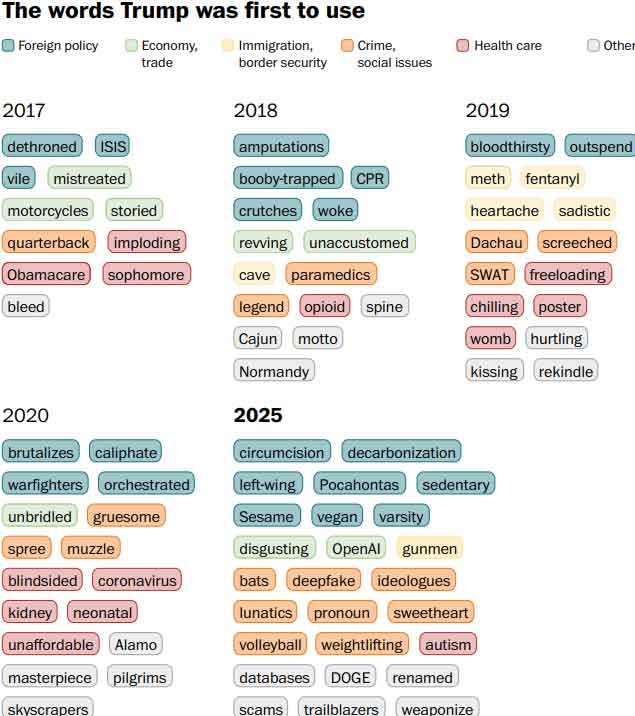
Speaking about contemporary subjects and describing his opponents in harsh terms, President Donald Trump used more than two dozen words Tuesday night that had never been spoken in a State of the Union or similar address to Congress.
The president sketched rivals as "left-wing," "weaponizing," "lunatics," "ideologues," and, in a dig at Sen. Elizabeth Warren (D-Massachusetts), "Pocahontas."
In talking about transgender transition care, which he called "the sexual mutilation of our youth," Trump used for the first time "pronoun" and a few words about sports: "volleyball," "weightlifting" and "varsity."
Trump mentioned "deepfake" and "OpenAI" when talking about the growth of artificial intelligence. Describing his work with billionaire Elon Musk, Trump brought up "databases," "scams" and "DOGE" and unusual adjectives linked to spending that had been targeted: "sedentary," "circumcision," "vegan" and "Sesame," in reference to a version of the children's show "Sesame Street" intended for an audience in the Middle East.
Talking about crime and immigrants, Trump introduced the terms "gunmen" and "bats," as in weapons, not flying mammals.
The president was the first to mention "autism" in describing Health and Human Services Secretary Robert F. Kennedy Jr.'s assignment to investigate the condition.
His speech was the first to bring up Greenland in that kind of address to Congress. In talking about foreign aid spending, he also cited for the first time Uganda, Moldova and Lesotho.
During Trump's first term, his annual addresses added many notable phrases such as imploding, ISIS, Obamacare, vile, bleed, dethrones (2017); booby-trapped, amputations, woke, revving and crutches (2018); bloodthirsty, womb, SWAT, sadistic, meth, fentanyl, heartache (2019); and blindsided, neonatal, pilgrims, skyscrapers, warfighters and gruesome (2020).
In 2020, coronavirus was also added to the list. Trump did not mention covid or vaccines on Tuesday.
Trump's longest address to Congress expanded at greater length on most subjects - particularly the economy, immigration and crime.
Foreign affairs was dominated by the invasion of Ukraine. The president talked more about diplomacy than usual, even with barely any mention of Israel or Gaza, and none of Hamas or NATO.
This analysis of words relies on the American Presidency Project at the University of California at Santa Barbara for transcripts of the State of the Union, which was delivered as a written report in early years before it became a speech and then a televised national address. In some years, particularly the first year of a president’s term, the address is technically a budget address, but we included both forms of address here to be comprehensive.


 Contact The Editor
Contact The Editor
 Articles By This Author
Articles By This Author